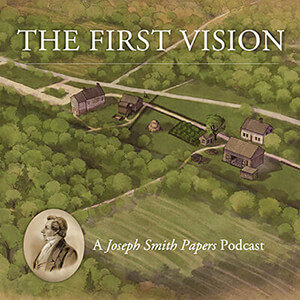 Title: The Empty Church:
Title: The Empty Church:
Author: Mette Ivie Harrison
Publisher: Signature Books
Genre: Essay and Poetry Collection
Year Published: 2019
Number of Pages: 280
Binding: Paperback
Price: $18.95
Title: The First Vision: A Joseph Smith Papers Podcast
Host: Spencer McBride
 Publisher: The Church of Jesus Christ of Latter-day Saints
Publisher: The Church of Jesus Christ of Latter-day Saints
Genre: Podcast, Historical
Year Published: 2020
Number of Episodes: 6
Available on various podcasting platforms.
Reviewed by Adam McLain for the Association for Mormon Letters
Journeys are sacred. We need to listen to and respect other people’s journeys especially when they are not like our own. This is how we learn, friends. This is what spiritual growth looks like. Seeing beyond what’s in your own house.
—Mette Ivie Harrison, “What I Still Believe,” in The Empty Church: Essays and Poetry on a Mormon Sabbatical
Because the Church of Jesus Christ of Latter-day Saints considers itself to be the Church of Jesus Christ restored to the Earth through heavenly messengers, the word revelation is sacrosanct. It’s something members understand, believe in, and engage with on a daily basis. Morning prayers can lead to revelation, lunch-time scripture reading can deliver revelation, and words delivered over a pulpit can be revelation.
Some within the Church might not consider The Empty Church: Essays and Poetry on a Mormon Sabbatical by Mette Ivie Harrison to be revelation, especially when written revelation about God is solely considered to be authorized and delivered only by a male prophet of God, and yet it is, in and of itself, an engagement with and fulfillment of a revelatory process and thus a revelation. Throughout the text, Harrison is clear that she believes, strongly, that God—the Universe—the Higher Power—is guiding her to write the essays and poetry that express her personal engagement with the Church that she struggles to stay within and/or leave behind. The book is beautiful, personal, and wonderful—an enlightening read about someone going through a faith transition and a chance to receive her candid take on the Church, on her own faith, and on her own journey. This isn’t a story distilled to myth that is shared over the pulpit; it’s an individual’s personal interaction with deity written on the page, stark and glowing.
While reading The Empty Church, the Joseph Smith Papers and the Church of Jesus Christ of Latter-day Saints released a podcast series titled The First Vision: A Joseph Smith Papers Podcast. In its six episodes, the podcast provides historical perspective to the oft-quoted story found at the back of a triple combination, a story that has been distilled into a myth from the multiple accounts of Joseph Smith. Spencer McBride connects historian’s work with reinvigorating and reinvestigating a story that many had the privilege to share countless times during a mission or while in the Church. The historical methodology applied to the Vision brings forth new insights and engaging, intellectual depth that helps the listener gain a fresher and deeper appreciation for the revelatory process Smith underwent.
Experiencing these disparate yet kindred stories in tandem led me to consider testimony and revelation. For example, what is a testimony when it doesn’t fit perfectly into the correlated gospel message delivered by the Church’s manuals? Both testimonies—that of Joseph Smith’s experience in the Sacred Grove and that of Harrison’s personal relationship to the Church—are not, according to their contemporary time periods, strictly orthodox, but both are testimony of interactions with God. What is revelation if it is not backed by authority? Both revelations are, at the time given, not backed by a hierarchical authority (Smith because the priesthood is not restored and Harrison because the priesthood has not been offered to women yet), but both are still revelations.
Growing up in the Church of Jesus Christ of Latter-day Saints, inside and outside of Utah but wholly in the western United States, I was taught that prophets held authority, given them by God, to receive revelation on behalf of and for the world. Others were distilled that ecclesiastical authority through priesthood keys granted from the prophet through proper lines of authority, and these people, like a bishop, ward president, or stake president, were privileged to receive revelation on behalf of the people within their given jurisdiction and assignment. In addition, parents could receive revelation for their children because they held stewardship over them, and individuals were supposed to be able to receive revelation for themselves. It was simple, clear cut, one could draw a line from self to father to bishop to stake president to area seventy to quorum of the twelve to first presidency to prophet to Jesus Christ to Heavenly Father to Grand-God to Great-Grand-God and so on. A never-ending chain of revelatory authority.
However, as I think on and consider revelation, especially in relation to these two texts, I realize, over and over, that revelation is not, and cannot, be that simple and clear cut. If it were, I don’t think, as members of the Church of Jesus Christ of Latter-day Saints believe, the Church believed-to-be-established by the first followers of Jesus Christ would have gone away from this planet. It’s the complications and the nuance of revelation that caused that institution to evolve into the great behemoth that we call Christianity or, as I prefer, Christianities. If revelation were simple (which, I will allow that some revelation is simple), then the Church would never have needed to be restored because it would have never left the Earth or shattered into many denominations.
At the same time that revelation is intricately tied to broad organizations, it is also personal. Individual. Yes, a prophet holds sway over a large amount that follow the words spoken from the prophet’s mouth, but the revelation a prophet receives, the guidance received from a divine being, is still funneled through that prophet’s personal experience, the personal view. We cannot divorce his (or her or their or xer, etc.) individuality and individualness from the layer of jurisdiction this individual is given.
Harrison’s work profoundly made me consider this individuality because she engaged with it. Throughout the text, Harrison expresses that revelation (whether her own, the lack of revelation given from leadership, or revelation that did not match her own personal revelation) led her away from the Church. As people who believe in revelation, especially the revelation of an individual, young boy in a grove of trees, Latter-day Saints are required to respect this revelation and accept that revelation for one is not revelation for another. I appreciate, especially in this moment of my own intercourse with revelation, Church, and God, that Harrison spent some of her time living on this planet to write a book that engaged with her own individual forms of belief, revelation, story, and vision. It helped me consider how I utilize guidance—whether from on high or from the weird chemical workings of a human body.
Like Harrison’s text, The First Vision podcast takes us back to an individual receiving individual revelation that others will eventually read, consider, and follow or not follow. Smith, the podcast reminds its listeners, was an individual person, a momentary conscious on this blip of a planet in a vast universe, who received guidance from some divine hand. It takes the listener back to before the atrocities in Missouri, before the gold-digging in New York and Pennsylvania, before the mobs, before the tarring and feathering, before the revelation upon revelation, before the polygyny, before the founding of a Church that grew from six members to over millions, before what we see today as the stalwart and monolithic Church of Jesus Christ of Latter-day Saints to that boy. That youth. In the woods. Wondering. Questioning. Praying.
The First Vision gives the listener what any great historical writing does: an opportunity to interact as if we, the reader, were in that moment. From podcast episodes about what the Sacred Grove would’ve looked like (ep. 6) to the religious moment of the time, the podcast gives us a different vision, a nuanced story, a testimony within the bonds of history.
This historical framework is so important to remember when interacting with grand institutions like what the Church of Jesus Christ of Latter-day Saints has become. It’s important to remember and be reminded that the leaders of this institution are still people—mostly white, cisgender male, heterosexual, patriarchal, etc.—and that people-ness can sometimes cloud and overshadow and, yes, inform in a positive way the revelation they receive. The podcast reminds us that the mythic Joseph Smith was once a child, a teenager, seeking an answer. It strips the veneer of the fabled Smith and gives us Joseph.
The Empty Church fiercely brings the reader into sharp understanding of the leadership’s fallibility, which I believe is important for any agent to be aware of. From questions like “Are we simply enforcing a norm of perfection where everyone looks the same?” (“Towards a More Inclusive Heaven”) and “If Mormon heaven includes eternal progression, how can it not include pain?” (“The Hole”), Harrison interrogates the very same belief she is on sabbatical from and takes time out of her life to provide readers with a vigorous questioning of beliefs that led her away from the comfortable middle of the Latter-day Saint tent to its very edge—even to the point of stepping outside of the tent to view the surrounding wilderness. I believe that any concerned Latter-day Saint who wants to be more like Jesus and improve their own circle of influence should engage with this book to learn from someone willing to discuss their faith journey out of that circle.
The best thing about listening to this podcast and reading this book at the same time comes as explained in a quote from Harrison’s “The Acorn and the Oak” essay: “We’re a better community when we aren’t just Mormons talking to Mormons.” Both texts broaden, a little, the conversation. Harrison’s text is one of a person exiting the Church, while the First Vision podcast is a historical look into someone creating that very same church she is exiting. Both provide a stark reminder and a sanguine release that has allowed this Mormon-adjacent-esque writer to appreciate roots and anticipate futures.
This review was originally published on the author’s personal blog, amclain.com, and has been lengthened for this publication.
